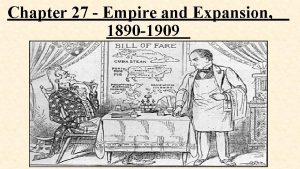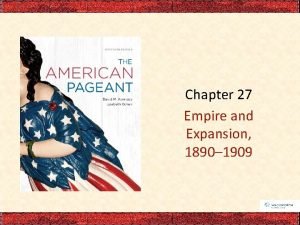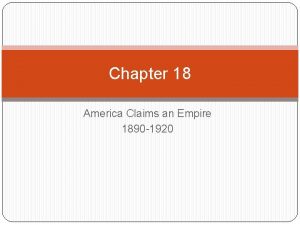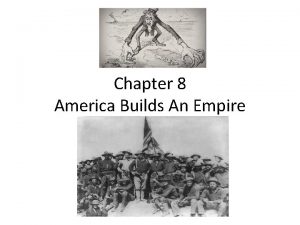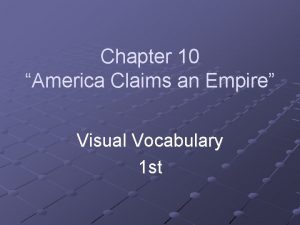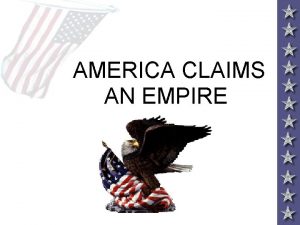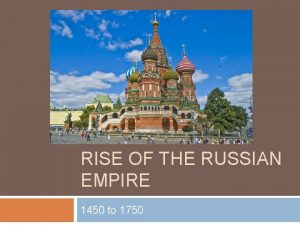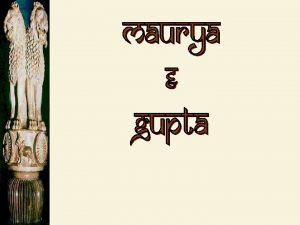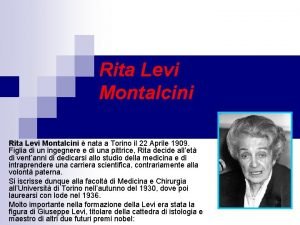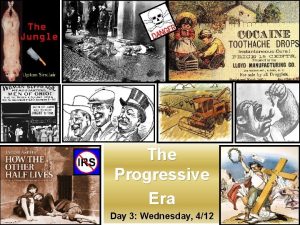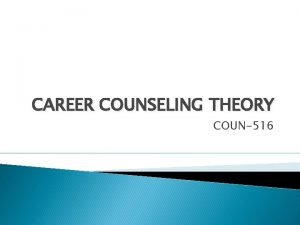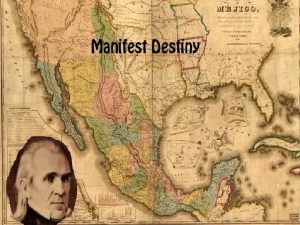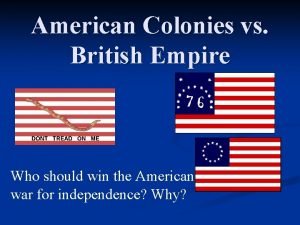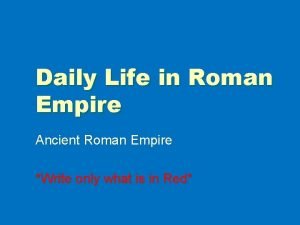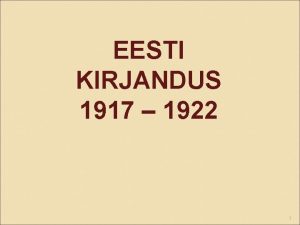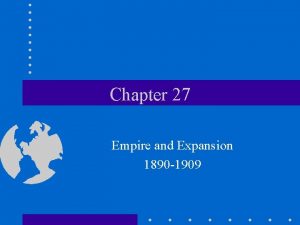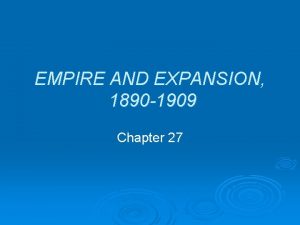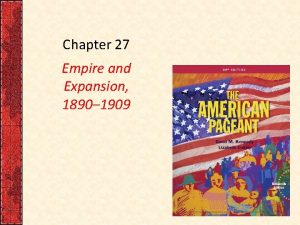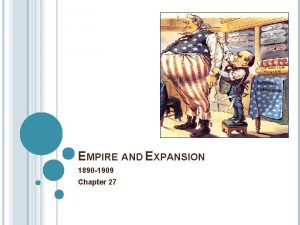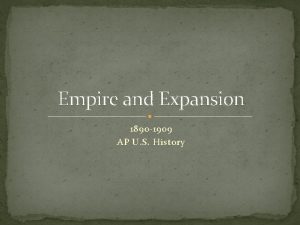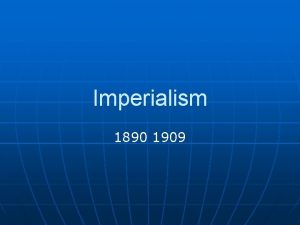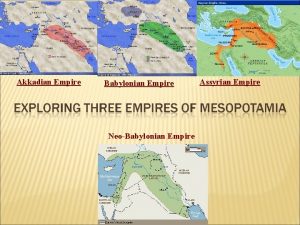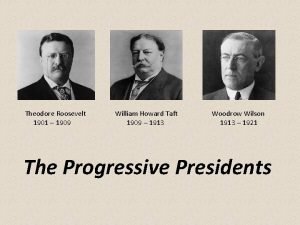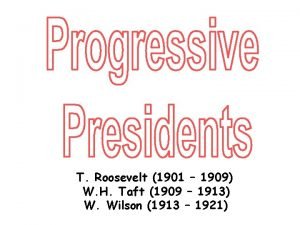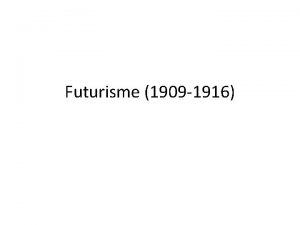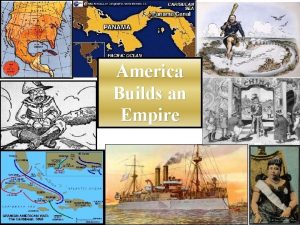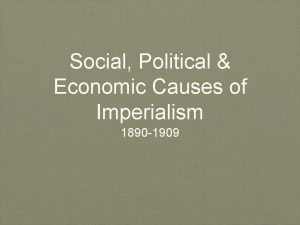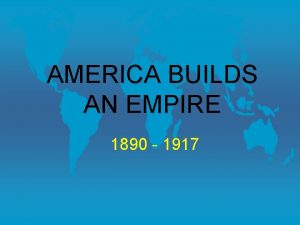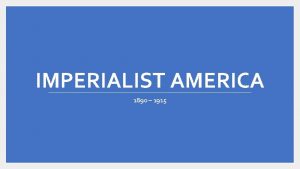CHAPTER 27 EMPIRE AND EXPANSION 1890 1909 America



















- Slides: 19

CHAPTER 27 EMPIRE AND EXPANSION 1890 -1909

America Turns Outward ◦ Americans felt expansion to overseas markets might provide relief to the labor violence and agrarian unrest that existed in the country ◦ Americans also felt emboldened with a new sense of power generated by the growth in population, wealth, and productive capacity. ◦ Reverend Josiah Strong's Our Country: Its Possible Future and Its Present Crisis inspired missionaries to travel to foreign nations. ◦ Capt Alfred Thayer Mahan's book of 1890, The Influence of Sea Power upon History, 1660 -1783, argued that control of the sea was the key to world dominance stimulated the naval race among the great powers. ◦ Sec. of State, James G. Blaine published his "Big Sister" policy tried to get the Latin American countries to open their markets to Americans. ◦ Americans prepared to go to war over many small disputes with other countries demonstrated country's new aggressive mood.

America’s First Steps Abroad ◦ Area between British Guiana and Venezuela had been in dispute for over 50 years ◦ Conflict between British and Venezuela arose when gold was discovered in the contested area ◦ Sec. of State, Richard Olney, warned that if Britain went to war with Venezuela, then Britain would be violating the Monroe Doctrine. ◦ When Britain disregarded this warning, President Cleveland threatened war. ◦ Britain was pre-occupied with other potential wars in Europe, so chose to avoid a new war and reconcile with the United States. ◦ The Great Rapprochement between the US and Britain became a cornerstone of both nations' foreign policies

Spurning the Hawaiian Pear ◦ First New England missionaries reached Hawaii in 1820 ◦ Beginning in the 1840 s, the State Department warned other countries to stay out of Hawaii ◦ 1887, a treaty with the native gov’t guaranteed naval-base rights at Pearl Harbor ◦ Sugar imports from Hawaii became less profitable with the Mc. Kinley Tariff of 1890, so American planters decided that the best way to overcome the tariff would be to annex Hawaii. ◦ Queen Liliuokalani insisted that native Hawaiian should control the islands. ◦ 1893, Americans successfully overthrew the Queen ◦ Most Hawaiians did not want to be annexed, though, so President Grover Cleveland decided to delay annexation of Hawaii.

Cubans Rise in Revolt ◦ Cubans revolted against Spanish rule in 1895. ◦ Cuban insurrectos burned sugar canefields believing that if they destroyed enough of Cuba, then Spain might abandon Cuba or US might move in and help the Cubans with their independence ◦ Spanish put Cubans in reconstruction camps so they could not support the insurrectos. ◦ America had a large investment and conducted substantial trade with Cuba. ◦ Congress passed a resolution in 1896 that recognized the revolting Cubans. ◦ President Cleveland opposed imperialism and he said that he would not go to war with Spain over Cuba.

The Mystery of the Maine Explosion ◦ William R. Hearst and Joseph Pulitzer used "yellow journalism" to inflate the anger of the American people over the crisis in Cuba. ◦ Feb. 15, 1898 - USS Maine blew up in the Havana port. ◦ Spanish claimed it was an accident (spontaneous combustion) ◦ Americans claimed that Spain had sunk it American people did not believe the Spanish, and war with Spain became imminent ◦ Spain had agreed to the Americans' 2 basic demands: an end to the reconstruction camps and an armistice with Cuban rebels. ◦ Although President Mc. Kinley did not want a war with Spain, the American people did. ◦ He conceded to the American people, and he sent his war message to Congress on April 11, 1898. ◦ Congress declared war and adopted the Teller Amendment. It said that when the United States had beaten the Spanish, the Cubans would be free.

Dewey's May Day Victory at Manila ◦ Spanish military significantly outnumbered American army, but American naval ships were in much better condition than the Spanish ◦ Commodore George Dewey's 6 -ship fleet attacked Spain's Philippines on May 1, 1898. ◦ Attacked and destroyed 10 -ship Spanish fleet at Manila. ◦ German ships threatened to attack Dewey's ships in the Manila harbor (claiming that they wanted to protect German nationals) potential for conflict blew over ◦ August 13, 1898, American troops captured Manila. ◦ With the victory in the Philippines, it was thought that Hawaii was needed as a supply base Congress passed a joint resolution of Congress to annex Hawaii on July 7, 1898

Confused Invasion of Cuba ◦ Shortly after the outbreak of the war, the Spanish government sent a fleet of warships to Cuba, led by Admiral Cervera blockaded in the Santiago harbor in Cuba by American ships. ◦ "Rough Riders, ” a regiment of American volunteers, was commanded by Colonel Leonard Wood and organized by Theodore Roosevelt. ◦ The advancing American army caused the Spanish fleet to retreat from the Santiago harbor fleet was entirely destroyed on July 3, 1898. ◦ US met little resistance when he took over Puerto Rico. ◦ Aug. 12, 1898, Spain signed an armistice. ◦ Many more Americans had been killed by malaria, typhoid, and yellow fever than by bullets.

America's Course (Curse? ) of Empire ◦ Spanish and Americans met in Paris in 1898 to discuss terms to the end of the war ◦ Americans secured Guam and Puerto Rico, but the Philippines presented President Mc. Kinley with a problem: didn't want to give island back to Span but didn't want to leave island in a state of disarray. ◦ Mc. Kinley decided to Christianize all of the Filipinos. – b/c Manila had been captured the day after the war, America agreed to pay Spain $20 million for the Philippines. ◦ Treaty was controversial, esp. in regards to the acquisition of the Philippines ◦ Anti-Imperialistic League fought Mc. Kinley's expansionist moves, in regards to the Philippines. ◦ Expansionists argued that Americans have a duty to help the underprivileged people of the world. ◦ The Senate approved the treaty on Feb. 6, 1899

Perplexities in Puerto Rico and Cuba ◦ Foraker Act of 1900 gave Puerto Ricans a limited degree of popular government 1917: granted U. S. citizenship. ◦ Supreme Court's rulings in the Insular Cases declared that the Constitution did not extend to the Philippines and Puerto Rico ◦ US, honoring the Teller Amendment of 1898, withdrew from Cuba in 1902. ◦ U. S. forced the Cubans to write their own constitution of 1901 (the Platt Amendment) ◦ Cubans hated this doc because it was written to benefit Americans ◦ Constitution decreed that the United States might intervene with troops in Cuba to restore order and to provide mutual protection ◦ Cubans also promised to sell or lease needed coaling or naval stations to the U. S.

New Horizons in Two Hemispheres ◦ Although the Spanish-American War only lasted 113 days, it increased American prestige around the world. ◦ One of the greatest results of the war was the bonding between the North and the South

America and the Philippines ◦ Filipinos thought that the treaty would give them their independence, like the Cubans not the case and on Feb. 4, 1899, the Filipinos started a rebellion against the occupying American forces, led by Emilio Aguinaldo. ◦ , American soldiers captured the rebellion's leader, Emilio Aguinaldo, effectively ending the rebellion ◦ President Mc. Kinley appointed the Philippine Commission in 1899 to set up a Filipino government. ◦ William H. Taft led the body He genuinely liked the Filipinos, while the American soldiers did not ◦ President Mc. Kinley's plan of "benevolent assimilation" of the Filipinos was very slow and it involved improving roads, sanitation, and public health. ◦ Plan developed economic ties and set up a school system with English as the 2 nd language. This system was hated by the Filipinos who preferred liberty over assimilation.

Hinging the Open Door in China ◦ Following China's defeat by Japan in 1894 -1895, several European powers move into China. ◦ Sec. of State John Hay released the Open Door note urged foreign powers to respect Chinese commercial rights. ◦ Russia was the only major power to not accept it. ◦ 1900, Chinese group known as the "Boxers" killed hundreds of foreigners in the Boxer Rebellion. ◦ A multinational rescue force came in and stopped the rebellion. ◦ After the failed rebellion, Secretary Hay declared in 1900 that the Open Door would include the respect of Chinese territory, in addition to its commercial integrity.

Imperialism or Bryanism in 1900? ◦ Pres Mc. Kinley was the Republican presidential nominee for the election of 1900 because he had led the country through a war, acquired rich real estate, established the gold standard, and brought prosperity to the nation. ◦ Mc. Kinley and the Republican Party supported the gold standard and imperialism. ◦ Theodore Roosevelt was nominated as the vice president. ◦ William Jennings Bryan was the Democratic presidential candidate for the election. ◦ Supported silver standard anti-imperialism ◦ Proclaimed the paramount election issue was Republican overseas imperialism ◦ Republican party proclaimed that Bryan would destroy the nation's prosperity once he took office with his free-silver policy and other "dangerous" ideas. ◦ Mc. Kinley and the Republican Party won the election of 1900.

TR: Brandisher of the Big Stick ◦ September 1901, President Mc. Kinley was assassinated ◦ Theodore Roosevelt took over the presidency. ◦ Roosevelt felt that the president should lead, boldly ◦ Had no real respect for the checks and balances system among the 3 branches of government ◦ Felt he may take any action in the general interest of the public that is not specifically forbidden by the Constitution.

Building the Panama Canal ◦ Americans wanted to build a canal through Central American - allow ships to quickly cross from the Atlantic to Pacific Ocean. ◦ Because of friendly relations with Britain, Britain signed the Hay-Pauncefote Treaty in 1901 allowed the U. S. to build and fortify the canal. ◦ Congress decided to build the canal through Panama. ◦ An offer to buy land for the canal had been rejected by the Colombian senate, who thought the U. S. monetary offer was too low. ◦ Panamanians feared the U. S. would choose the Nicaraguan route for the canal; Panama would miss out on a prosperity created by the canal's construction ◦ Nov. 3, 1903, Panamanians successfully revolted against Columbian rule. Revolt led by Bunau-Varilla. ◦ He became the Panamanian minister to the US and signed the Hay-Bunau. Varilla Treaty in Washington gave U. S. control of 10 -mile zone around proposed Panama Canal ◦ Involvement in Panama marked a downward lurch in U. S. relations with Latin America. ◦ 1904 -1914 construction of the Panama Canal cost of $400 million.

TR's Perversion of Monroe's Doctrine ◦ Several Latin American countries were in debt to European countries. ◦ Roosevelt feared that this would allow for future European involvement in Latin America, so he created a policy known as "preventive intervention. " ◦ Roosevelt Corollary to the Monroe Doctrine declared that the U. S. could pay off the Latin American counties' debts to keep European nations out of Latin America. ◦ Latin American countries hated the Monroe Doctrine because it had become the excuse for numerous U. S. interventions in Latin America - President Roosevelt was the one to blame for the interventions

Roosevelt on the World Stage ◦ Japan went to war with Russia in 1904 after Russia failed to withdraw troops from Manchuria and Korea. ◦ Roosevelt brokered a peace agreement in 1905 in Portsmouth, New Hampshire. ◦ Japanese received no compensation for their losses and the southern half of Sakhalin. ◦ Because of the treaty, friendship with Russia waned and Japan became a rival with America in Asia.

Japanese Laborers in California ◦ Thousands of Japanese were recruited to work in California after the Japanese government lifted its emigration ban in 1884. ◦ Japanese immigrants were confronted with racist hostility by whites. ◦ 1906, San Francisco's school board segregated the Chinese, Japanese, and Korean students to make room for white students ◦ Japanese saw this action as an insult and threatened with war. ◦ President Roosevelt stepped in and persuaded the CAs to repeal segregation ◦ Japanese agreed to stop flow of immigrants to US - known as the "Gentlemen's Agreement. " ◦ In 1908, the Root-Takahira agreement was reached with Japan. The U. S. and Japan pledged themselves to respect each other's territorial possessions.
 Algeciras conference apush
Algeciras conference apush Chapter 27 empire and expansion
Chapter 27 empire and expansion Chapter 18 building vocabulary america claims an empire
Chapter 18 building vocabulary america claims an empire Chapter 8 america builds an empire
Chapter 8 america builds an empire Chapter 10 america claims an empire vocabulary
Chapter 10 america claims an empire vocabulary Chapter 10 building vocabulary america claims an empire
Chapter 10 building vocabulary america claims an empire Chapter 18 building vocabulary america claims an empire
Chapter 18 building vocabulary america claims an empire Chapter 18 america claims an empire
Chapter 18 america claims an empire Russian empire architecture 1450 to 1750
Russian empire architecture 1450 to 1750 Venn diagram of mauryan and gupta empires
Venn diagram of mauryan and gupta empires Nata a torino nel 1909
Nata a torino nel 1909 Kip domovine leta 188 mjesto radnje
Kip domovine leta 188 mjesto radnje The reform discussed by governor johnson in this excerpt
The reform discussed by governor johnson in this excerpt Frank parsons’ trait and factor theory
Frank parsons’ trait and factor theory Expansion of the united states of america 1607 to 1853 map
Expansion of the united states of america 1607 to 1853 map American empire vs british empire
American empire vs british empire Life in the roman empire
Life in the roman empire Old imperialism vs new imperialism
Old imperialism vs new imperialism Kirjanik 1890-1952
Kirjanik 1890-1952 Agnosia cromatica
Agnosia cromatica
